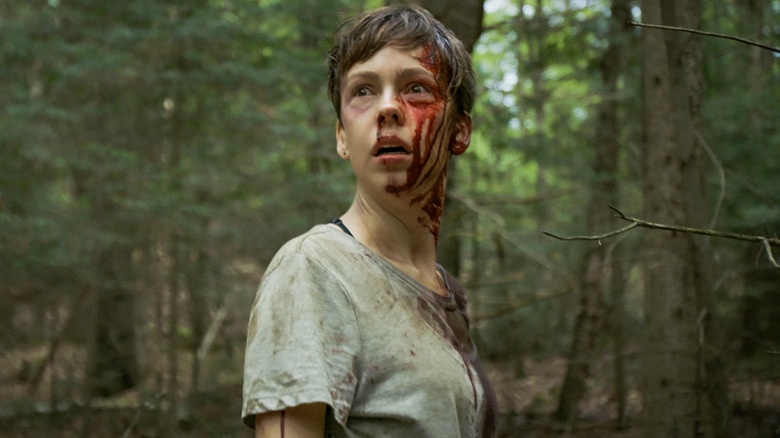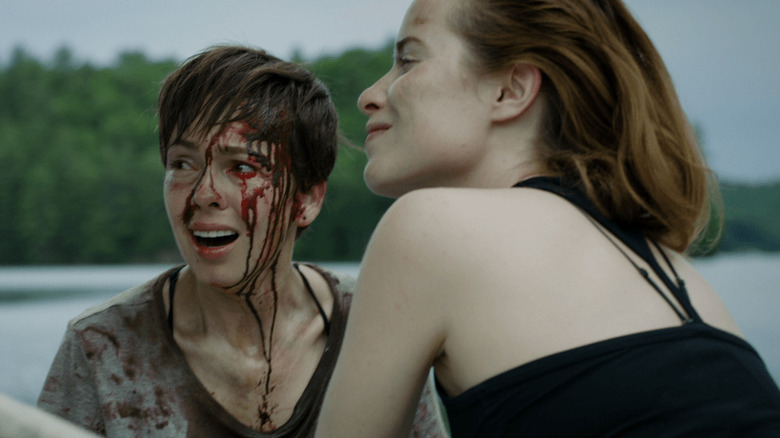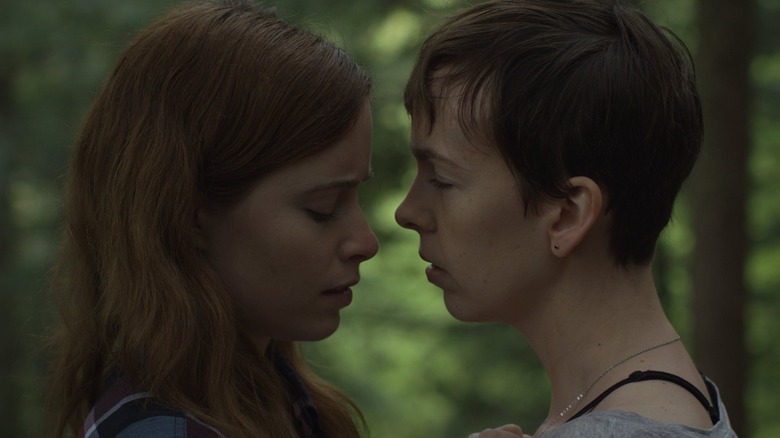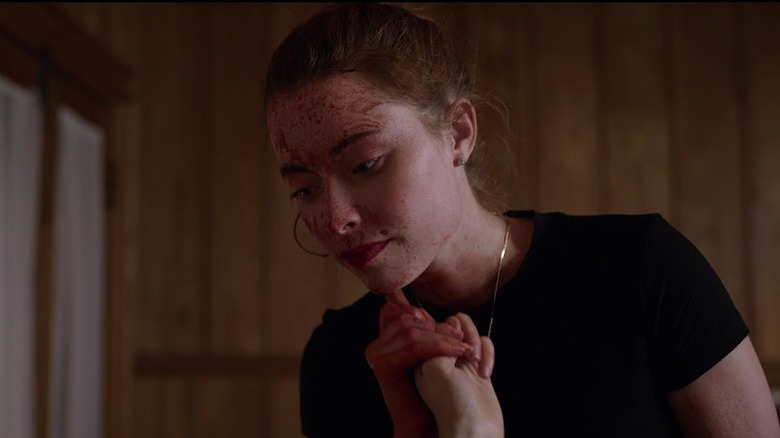The Daily Stream: What Keeps You Alive Subverts The Predatory Lesbian Trope
(Welcome to The Daily Stream, an ongoing series in which the /Film team shares what they've been watching, why it's worth checking out, and where you can stream it.)
The Movie: "What Keeps You Alive"
Where You Can Stream It: Netflix
The Pitch: Directed by Colin Minihan ("Grave Encounters," "Extraterrestrial," "Spiral"), this 2018 Canadian psychological thriller follows Jackie (Hannah Emily Anderson) and Jules (Brittany Allen), a young lesbian couple celebrating their first anniversary at a secluded cabin owned by Jackie's family.
Upon their arrival, something about Jackie's demeanor changes completely. Jules tries to look beyond her odd behavior, but when Jackie's childhood friend Sarah arrives and calls her "Megan," Jules' concerns become unavoidable. As the duo try their best to enjoy this vacation in the woods, Jackie reveals her true nature and Jules is forced to reckon with the reality that she truly doesn't know the woman she married, and if she doesn't think fast, she may not make it home alive.
Why It's Essential Viewing
The history of horror is rooted in the creativity of queer creators, but the genre has a terrible track record with how queerness has been represented. Lesbian representation in horror films in particular has always been complex, with many of us seeing ourselves as vampire killers, monsters hellbent on destruction, psychotically possessive friends, or predatory seductresses. The sexual identity of a lesbian in a horror film is typically the motivation for their villainy or a justification for our deaths. "What Keeps You Alive" takes a completely different approach.
Jackie and Jules are a married lesbian couple and the horror of their relationship is not rooted in the mere existence of queerness; it's based on Jackie's emotional manipulation and dishonesty. When the fight to legalize non-heterosexual marriage was in full swing, there was a huge push of the "we're just like you" mentality from activists desperately trying to normalize queer relationships. Couples who had been together 50+ years but had never married were pushed to the forefront, which also meant stories of queer breakups or abusive relationships were completely swept under the rug by the mass populous. Because queer existence is still so stigmatized across the globe, there are very few examples in the media of showcasing that yes, queer relationships, just like straight relationships, can also be toxic and downright dangerous.
You Kill What Keeps You Alive
The title of "What Keeps You Alive" comes from a story Jackie tells about hunting with her father, who advised that she only ever kill for survival or nourishment. With Jackie's cat-and-mouse pursuit of Jules, the breakdown of this relationship and Jules' realization that she essentially married a total stranger is just as heartbreaking as it is horrific. Jules catches Jackie practicing expressing sadness or concern, and her reaction to realizing that every moment, every conversation, every expression of love or affection has all been an act is mortifying. The physical harm will heal, but that psychological pain will linger for far longer.
As trivial as it sounds, it's still groundbreaking to see a queer relationship allowed to have issues beyond navigating the world as a queer couple. It's not about bigots who want to cause them harm, it's not about parents that can't accept or affirm their children, and it's not about having to fight systemic oppression in a conservative area. "What Keeps You Alive" is about a relationship gone very, very wrong, and what it feels like to have to figure out how to escape.
Born This Way
The idea of a lesbian pursuing another woman in the woods has exploitation film written all over it, but there's an exhilarating balance to Minihan's filming which never feels objectifying or fetishistic. Jules feels like she's in legitimate danger, and Brittany Allen's performance is devastating to watch. The pain we feel watching her struggle emotionally as she processes the truth of her wife's intentions is just as palatable as the pain we feel as she pops dislocated bones back into place, and Minihan's framing puts these traumas on a similar playing field. Allowing the emotional turmoil the same gravity as physical trauma means this is a movie is about the painful mourning of a lesbian marriage, just as much as it is a survival thriller.
Jackie feels compelled to kill Jules because it's the way her brain was wired. When Jules finally asks Jackie what happened to make her act like this, she replies in complete seriousness, "Nature not nurture." Jackie cannot help her desire to kill any more than she can help her desire for women. The difference in this film, compared to most lesbian horror films that came before, is that these aspects of Jackie's identity are not mutually exclusive. Jackie isn't violent because she's queer, nor is she queer because she's violent. Jackie is a murderer devoid of empathy or conscience who just so happens to be queer.
Perhaps there's something wrong with the way I'm wired to find a film like this so refreshing, but it sure is nice to be able to root against a lesbian villain because she's genuinely despicable without a movie insinuating that I am just a gay ticking time bomb away from becoming the same because I happen to identify similarly.



